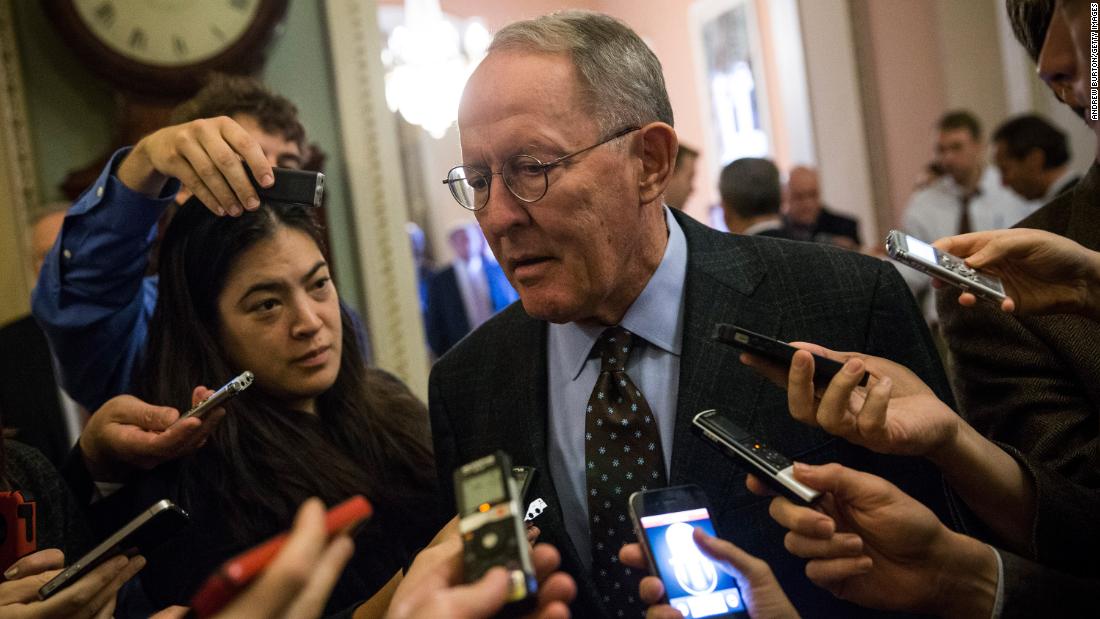[ad_1]
It’s unclear how Alexander will vote. On Thursday morning, he said he still hadn’t made up his mind.
Collins, Murkowski and Romney asked multiple questions throughout the day trying to establish whether President Donald Trump held up aid to Ukraine because he wanted to damage his 2020 political rival, former Vice President Joe Biden. Romney wanted to know when Trump ordered to freeze the security assistance. Collins and Murkowski wondered whether Trump discussed Biden and Ukrainian corruption with his aides before the former vice president announced his 2020 campaign. Alexander, meanwhile, was mum. He took notes.
Before the questioning began, Tom Ingram, a prominent Tennessee Republican strategist who’s known Alexander for more than 50 years, told CNN that his old boss views his role in the trial as a juror — “and jurors don’t talk much.” But over the past week, Alexander has appeared keenly interested in various arguments from the defense team.
On Wednesday, Republican Sen. Rob Portman of Ohio asked the White House lawyers how the Senate, which can’t handle much work outside impeachment during the trial, should “address the implications of allowing the House to present an incomplete case to the Senate and request the Senate to seek additional witnesses.” Alexander paid particular attention to deputy White House counsel Patrick Philbin, who answered that they “would be very grave” for the institution and prevent its work for months as it fought over a long list of witnesses.
But Democrats are hopeful that recent revelations striking at the heart of the White House’s defense will persuade Alexander and others to press for new testimony.
“Any one of them is a possibility,” he added.
But Alexander is likely their best.
Long history of bipartisan appeal
In 2011, he stepped down from the Senate Republican leadership team in order to improve his odds of working with Democrats to pass legislation. He supported the comprehensive immigration reform bill that passed the Senate in 2013 and crafted a major revision to the No Child Left Behind education law with Democratic Sen. Patty Murray of Washington that passed in 2015. Alexander and Murray, the chairman and the top Democrat on the Health, Education, Labor and Pensions committee, have since set their sights on lowering the cost of prescription drugs and health care.
An ally to Republicans
But while he may be free of political constraints, and has won bipartisan respect as a sober-minded legislator, Alexander is still a wild card when it comes to the impeachment trial.
He is an ally of the President. Alexander has overwhelmingly voted with Trump and supported the two main legislative efforts of his presidency, the 2017 tax overhaul bill and the repeal of the Affordable Care Act. He’s voted to confirm scores of conservative judges and pushed Trump’s controversial Education Secretary nominee, Betsy DeVos, through the Senate. He has called Senate Majority Leader Mitch McConnell a friend for about half of his life.
When asked if the Trump trial will affect Alexander’s legacy, Tom Griscom, a former press secretary for Baker, told CNN, “I think legacy is shaped by the totality of service.”
While the Senate may approve subpoenas for witnesses, it’s highly unlikely that 20 Republican senators will join Democrats in convicting the President on either count—abuse of power or obstruction of Congress.
On Monday, Alexander appeared more animated by Ken Starr’s defense of the President than by any of the previous presentations put forward by the House managers.
When Starr pointed out that Richard Nixon’s impeachment was “powerfully bipartisan,” Alexander picked up his pen. Starr, the independent counsel whose investigation resulted in a Senate trial for President Bill Clinton, argued that impeachment “divides the country like nothing else.” He said impeachment and removal “overturns” the last election and “perhaps profoundly affects an upcoming election.” Alexander kept on scribbling.
Starr then urged the Senate to close the “idiosyncratic chapter” of “this increasingly disruptive act” of resorting “to the Constitution’s ultimate democratic weapon for the presidency.”
“Let the people decide,” Starr said.
Alexander, along with Collins, Murkowski and Romney, again took note.
[ad_2]
Source link


